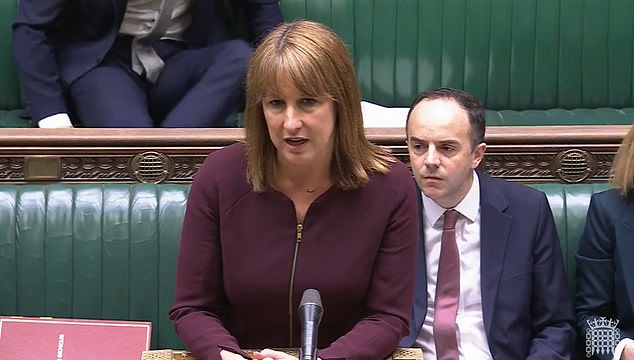Rachel Reeves is begging ministers to rein in spending as Brits face the mounting threat of tax hikes at the Budget.
The Chancellor has written to colleagues warning that they will not be bailed out by the Treasury if they fail to control costs.
The letter came as businesses voiced alarm that they will be targeted again amid fears Ms Reeves faces a black hole of up to £50billion on the public finances.
The CBI warned that Labour would be better off smashing its manifesto pledges against increasing income tax, employee national insurance, or VAT.
The slowing economy, rising debt interest costs and calls for more spending have left the government under massive pressure ahead of the Budget on November 26.

Rachel Reeves is begging ministers to rein in spending as Brits face the mounting threat of tax hikes at the Budget
Labour MPs are clamouring for ‘wealth taxes’ to fuel spending splurges, after killing off efforts to curb the spiralling benefits bill and winter fuel allowance for pensioners.
But Ms Reeves poured cold water on the idea yesterday, saying there is no certainty about what revenue a new levy would bring in.
Asked by Labour MP Steve Witherden whether she will protect working people by taxing the wealthy, and avoid ‘regressive’ spending cuts, Ms Reeves replied: ‘Some countries around the world do have a wealth tax, but countries like Switzerland for example don’t have inheritance tax.
‘I think it would be a mistake to get rid of inheritance tax and replace it with an unproven tax without knowing what revenue it would bring in.’
Markets have been pushing up the interest rates on government borrowing over recent weeks in a sign of doubts that Ms Reeves will take tough action.
She has laid down the law to colleagues that the £9billion Treasury Reserve will only be used for ‘genuinely unforeseen, unaffordable and unavoidable pressures’, rather than costs such as higher public sector pay.
Reserve funds will only be considered for departments that have already maximised their savings, according to the letter seen by the BBC.
Ms Reeves has told the Cabinet that ‘reducing inflation, controlling spending and kickstarting growth’ will be the focus of the government.
She talked up the need to bolster growth as she briefed Keir Starmer’s reshuffled top team yesterday.
‘The entire autumn, and beyond, must be about growing the economy in a way that makes working people better off and provides the revenues we need to fund our public services,’ the Chancellor said, according to a No10 readout.
She said the Government would ‘deliver economic stability and public investment so that consumers have the confidence to spend and businesses have the confidence to invest’.
Ms Reeves acknowledged here was more the Government ‘must do to attract international investment, drive jobs and growth across the country, get Britain working, back the builders and not the blockers, and buy British’.
Writing in the Guardian, CBI chief Rain Newton-Smith urged Labour to ‘grasp the nettle and find the right solutions to the big challenges on tax and regulation’.
She warned that employment rights legislation currently going through Parliament will add ‘cost and complexity, is already leading some firms to put hiring plans on ice, and risks making it even harder to bring people back into work’.
The government has dismissed hopes that the proposals will be watered down after the resignation of Angela Rayner.
‘The chancellor cannot raid corporate coffers again so she must look elsewhere, embracing long-term strategic tax reforms rather than maintaining a slavish adherence to manifesto promises on tax or ideas based on the world as it was 18 months ago,’ Ms Newton-Smith said.
‘The chancellor must commit to tax reform, not just tax rises. It is the structure of the system, not just the rates, that holds back growth: business rates penalise investment; the VAT threshold discourages scaling; and stamp duty restricts labour mobility.’
Labour deputy leadership hopeful Emily Thornberry listed a wealth tax as one of her key issues as she declared her candidacy.
It is unclear what form one would take, but some senior figures have proposed a 2 per cent levy on assets of over £10million – claiming that could raise billions of pounds for the Treasury.











